SINGAPORE: The Singapore Ministry of Health (MOH) has found seven of 22 cord blood units (CBU) storage tanks operated by a private cord blood bank have been exposed to temperatures above the acceptable limits of below -150 degrees Celcius.
Thus, MOH has issued a notice to the operator, Cordlife Group Ltd (CGL), to stop, for a period of up to six months, the collection, testing, processing, and/or storage of any new cord blood and human tissues, or provide any new types of tests to patients, pending CGL’s written representations.
“While investigations are still ongoing, a notice to stop is necessary to safeguard patients’ interest,” said MOH on its website today.
CGL is currently licensed under the Healthcare Services Act 2020 (HCSA) as a cord blood banking service, human tissue banking service, and clinical laboratory service.
MOH said it had received a complaint on July 24, 2023, by a member of the public alleging that CBUs stored in a tank at CGL had been exposed to temperatures above 0°C, as well as other service quality issues.
Following the complaint, MOH said it conducted unannounced audits.
The audits uncovered that CGL’s cryopreserved CBUs had been exposed to temperatures above the acceptable limits in seven of 22 CBU storage tanks at different periods from November 2020 to date, it said.
Based on CGL’s inventory records provided to MOH, an estimated 2,200 CBUs belonging to about 2,150 clients in one of the affected tanks (Tank A) were exposed to temperatures beyond the acceptable limits for several days in February, March, and June 2022.
According to MOH, CGL had tested some of the donated CBUs stored in Tank A to establish the cell viability of the affected CBUs.
MOH, meanwhile, appointed a panel of three cord blood banking experts to conduct an independent review of CGL’s test results.
“All of the experts have concluded that the CBUs stored in Tank A have been damaged, and are unlikely to be suitable for stem cell transplant purposes,” said the ministry.
MOH said investigations are ongoing for the remaining six storage tanks containing approximately 17,300 CBUs which belong to an estimated 17,050 clients.
CBU storage is a private service that has emerged over the last 20 years, offered to parents when their babies are first born.
The cord blood contains stem cells known as hematopoietic stem cells which may be used in stem cell transplants to treat blood diseases and some cancers, such as leukemia and lymphoma, should the baby develop these illnesses later in life. -Bernama









